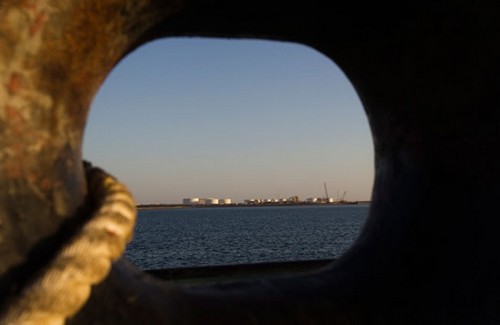Iran drafts bill to block Hormuz for Gulf oil tankers
13:54 - 4 July 2012

KRDPA: Iran\'s National Security and Foreign Policy Committee has drafted a bill calling for Iran to try to stop oil tankers from shipping crude through the Strait of Hormuz to countries that support sanctions against it, a committee member said on Monday.
The Iranian parliament is vocal and sees itself as independent but does not hold much power. Bills are unlikely to get far unless sanctioned by the leadership.
\"There is a bill prepared in the National Security and Foreign Policy committee of Parliament that stresses the blocking of oil tanker traffic carrying oil to countries that have sanctioned Iran,\" Iranian MP Ibrahim Agha-Mohammadi was quoted by Iran\'s parliamentary news agency as saying.
\"This bill has been developed as an answer to the European Union\'s oil sanctions against the Islamic Republic of Iran.\"
Agha-Mohammadi said that 100 of Tehran\'s 290 members of parliament had signed the bill as of Sunday.
However no details were given on how Iran would verify the destination of every ship passing out of the Gulf under the watchful eye of the U.S. Navy.
Iranian threats to block the waterway through which about 17 million barrels a day sailed in 2011 have grown in the past year as U.S. and European sanctions aimed at starving Tehran of funds for its nuclear program have tightened.
A heavy western naval presence in the Gulf and surrounding area is a big impediment to any attempt to block the vital shipping route through which sails most of the crude exported from Saudi Arabia, the United Arab Emirates, Kuwait and Iraq and nearly all the gas exported from Qatar.
A European Union ban on imports of Iranian oil started on Sunday.
If the bill is approved by parliament it would then have to be approved by the 12-member Council of Guardians, made up of Muslim clerics and lawyers selected by the supreme leader, which can veto any bill.
Top oil exporter Saudi Arabia has already taken precautionary steps against the possibility of Iran shutting down Hormuz, including the reopening of an old pipeline built by Iraq to bypass the strait and export more crude via the Red Sea terminals.
The United States has also sent four minesweepers to the Gulf to bolster the U.S. Fifth Fleet after an Iranian military chief refreshed threats of blocking Hormuz.
The Iranian parliament is vocal and sees itself as independent but does not hold much power. Bills are unlikely to get far unless sanctioned by the leadership.
\"There is a bill prepared in the National Security and Foreign Policy committee of Parliament that stresses the blocking of oil tanker traffic carrying oil to countries that have sanctioned Iran,\" Iranian MP Ibrahim Agha-Mohammadi was quoted by Iran\'s parliamentary news agency as saying.
\"This bill has been developed as an answer to the European Union\'s oil sanctions against the Islamic Republic of Iran.\"
Agha-Mohammadi said that 100 of Tehran\'s 290 members of parliament had signed the bill as of Sunday.
However no details were given on how Iran would verify the destination of every ship passing out of the Gulf under the watchful eye of the U.S. Navy.
Iranian threats to block the waterway through which about 17 million barrels a day sailed in 2011 have grown in the past year as U.S. and European sanctions aimed at starving Tehran of funds for its nuclear program have tightened.
A heavy western naval presence in the Gulf and surrounding area is a big impediment to any attempt to block the vital shipping route through which sails most of the crude exported from Saudi Arabia, the United Arab Emirates, Kuwait and Iraq and nearly all the gas exported from Qatar.
A European Union ban on imports of Iranian oil started on Sunday.
If the bill is approved by parliament it would then have to be approved by the 12-member Council of Guardians, made up of Muslim clerics and lawyers selected by the supreme leader, which can veto any bill.
Top oil exporter Saudi Arabia has already taken precautionary steps against the possibility of Iran shutting down Hormuz, including the reopening of an old pipeline built by Iraq to bypass the strait and export more crude via the Red Sea terminals.
The United States has also sent four minesweepers to the Gulf to bolster the U.S. Fifth Fleet after an Iranian military chief refreshed threats of blocking Hormuz.



